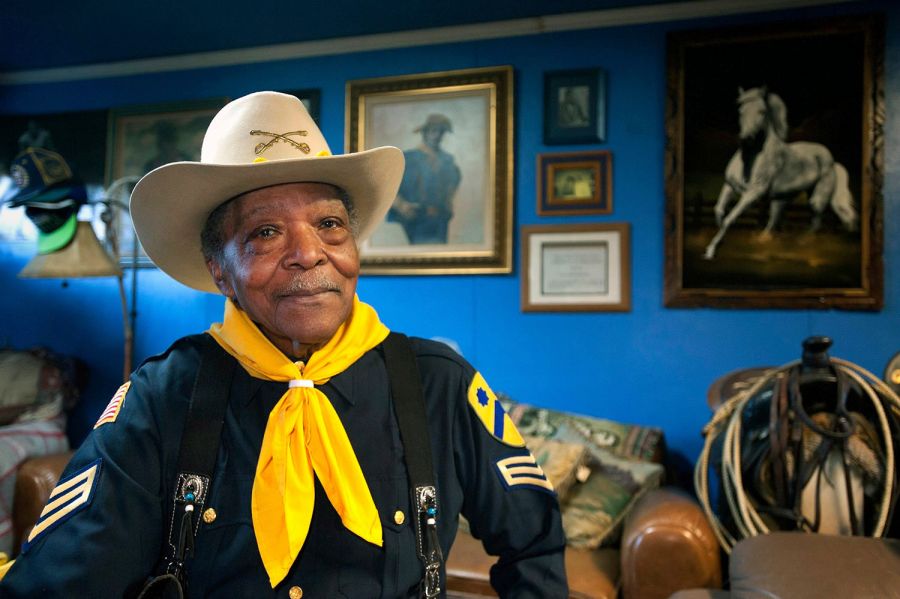Welcome to DU!
The truly grassroots left-of-center political community where regular people, not algorithms, drive the discussions and set the standards.
Join the community:
Create a free account
Support DU (and get rid of ads!):
Become a Star Member
Latest Breaking News
Editorials & Other Articles
General Discussion
The DU Lounge
All Forums
Issue Forums
Culture Forums
Alliance Forums
Region Forums
Support Forums
Help & Search
African American
Related: About this forumBuffalo soldier, 98, doesn't want black regiments' history to 'fade out'
https://www.stripes.com/lifestyle/military-history/buffalo-soldier-98-doesn-t-want-black-regiments-history-to-fade-out-1.568843
When Clyde Robinson was drafted into the U.S. Army’s 9th Cavalry Regiment in 1942, he had never heard of the buffalo soldiers. He did not know that he would become part of the storied, complicated legacy of the all-black regiments of the U.S. military.
Robinson served in the Philippines in World War II. Now 98 and living in Skyway, he proudly proclaims that he is the “last remaining buffalo soldier in Seattle and Tacoma.”
The term “buffalo soldiers” refers to the men who served in the four all-black Army regiments founded after the Civil War. According to legend, the name was bestowed by Native people who thought the soldiers’ hair looked like buffalo fur. Other lore contends it was due to the soldiers’ fierceness in battle.
The all-black regiments patrolled new settlements in the West, built infrastructure that helped make westward expansion possible, and fought in every U.S. war after the Civil War until the U.S. Army was desegregated in 1948. However, despite their significant role in U.S. history, their own story has been largely erased over time.
Robinson served in the Philippines in World War II. Now 98 and living in Skyway, he proudly proclaims that he is the “last remaining buffalo soldier in Seattle and Tacoma.”
The term “buffalo soldiers” refers to the men who served in the four all-black Army regiments founded after the Civil War. According to legend, the name was bestowed by Native people who thought the soldiers’ hair looked like buffalo fur. Other lore contends it was due to the soldiers’ fierceness in battle.
The all-black regiments patrolled new settlements in the West, built infrastructure that helped make westward expansion possible, and fought in every U.S. war after the Civil War until the U.S. Army was desegregated in 1948. However, despite their significant role in U.S. history, their own story has been largely erased over time.
InfoView thread info, including edit history
TrashPut this thread in your Trash Can (My DU » Trash Can)
BookmarkAdd this thread to your Bookmarks (My DU » Bookmarks)
5 replies, 1558 views
ShareGet links to this post and/or share on social media
AlertAlert this post for a rule violation
PowersThere are no powers you can use on this post
EditCannot edit other people's posts
ReplyReply to this post
EditCannot edit other people's posts
Rec (14)
ReplyReply to this post
5 replies
 = new reply since forum marked as read
Highlight:
NoneDon't highlight anything
5 newestHighlight 5 most recent replies
= new reply since forum marked as read
Highlight:
NoneDon't highlight anything
5 newestHighlight 5 most recent replies
Buffalo soldier, 98, doesn't want black regiments' history to 'fade out' (Original Post)
Recursion
Feb 2019
OP
NeoGreen
(4,033 posts)1. I hope I look that healthy when...
...I'm 68.

Myrddin
(327 posts)2. I never knew that.
Thanks, Recursion.
The term was familiar (from a Bob Marley song IFIRC?) but I wasn't aware of the significance.
The education is very much appreciated.
akraven
(1,975 posts)3. I got to meet the son of a guy who served as a "buffalo soldier".
He was an incredible guy (the son) and had some great stories to share. These guys were heroes of the finest kind. Thanks for the reminder.
TomSlick
(11,888 posts)4. Not to worry, Sergeant.
The memory of the Buffalo Soldiers will not soon fade.
![]()
cilla4progress
(25,904 posts)5. I've been trying to find a film history of them -
I've recently learned they were some of the first national park rangers!
But the only ones I've found focus on battles against Native Americans.